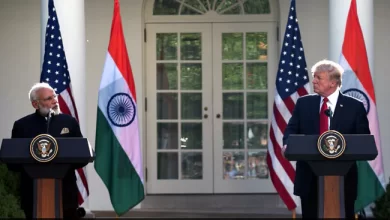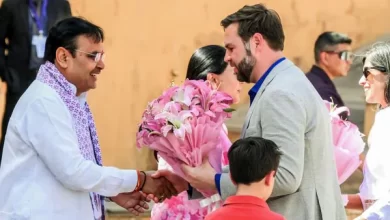
Gyanvapi to Sambhal & Ajmer Sharif, SC order on Places of Worship Act likely to impact 11 sites
The Supreme Court Thursday ordered all courts across the country not to pass any effective interim or final orders on suits disputing the character of existing places of worship. In an interim order, a special three-judge bench led by Chief Justice Sanjiv Khanna also directed that in case any fresh suit is filed before a civil court, requesting it to determine the character of a place of worship, it shall not be numbered.
“Effective interim would mean there will be no order for a survey,” clarified the bench, also comprising justices Sanjay Kumar and K.V. Viswanathan.
The order assumes significance as it comes in the backdrop of a string of civil suits pending in trial courts filed by Hindu parties, asserting their right to worship at sites where mosques exist. Immediate court orders on suits, directing survey of the religious structures has sparked a row, with critics arguing such directions violate the Places of Worship (PoW) Act.
The Supreme Court’s order is likely to impact pending cases involving 11 sites, including Gyanvapi complex, Jama Masjid in Sambhal in Uttar Pradesh, the Bhojshala site in Dhar, Madhya Pradesh, and Ajmer Sharif Dargah in Rajasthan. In all these disputes, petitioners have asserted their right to worship and, asking the court to determine the real character of the place of worship through a survey followed by a trial.
In some, court-directed surveys have already been carried out.
The Supreme Court order came on a batch of petitions challenging the constitutional validity of the Places of Worship Act, 1991. The top court is also hearing another set of petitions that want enforcement of said law that freezes the religious character of a place of worship as it existed on 15 August, 1947. The court observed that since both batches revolve around interpretation of sections 3 and 4 of the PoW Act, its contours and expanse, it would not be appropriate for civil courts to hold proceedings.
Section 3 of PoW Act prohibits conversion of a religious place of worship or a section of a religious place of worship into a place of worship of a different religion or a different denomination of the same religion. Violation of section 3 can lead to a three-year imprisonment and fine.
As per section 4(2) of the act, all appeals, suits or other proceedings with respect to converting the religious character of a place of worship shall end on the commencement of the act. Also, fresh appeals are not allowed to be filed.
The filing of civil suits raising disputes over sites where mosques are built picked up pace soon after a bench led by then CJI D.Y. Chandrachud made oral remarks that PoW Act did not bar “ascertainment of a religious character of a structure as on 15 August 1947”.
The observations were made when the Muslim side challenged a trial court order that led to a survey of Gyanvapi complex on the grounds that the suit claiming Hindus’ right to offer prayers on the premises was barred under the PoW Act.
It refused to pay heed to arguments made by the Muslim side that PoW Act was the law, even if it was under challenge before the top court.
‘Civil courts can’t run against SC’
CJI Khanna’s bench Thursday accepted the argument put forth by the lawyers supporting the PoW Act and demanding its strict implementation.
Justice Viswanathan brushed aside opposition to the interim order. “Your petition has raised grounds of constitutional validity of the act. They say this act has to be enforced, but there is a larger question, which is around section 3. And that is why suits have to be stayed.”
The judge then referred to the Supreme Court judgement in the Ayodhya case where the five-judge bench made observations about the PoW Act and its objectives that were to uphold the secular values of the country. Justice Viswanathan said even if section 3 of PoW Act is not invoked to object to civil suits being filed, “it ought to be objected to on the main constitutional principle” in view of the judgment outlining “this principle.”
“Civil courts cannot run a race with Supreme Court,” the judge observed.
“As the matter is sub judice, we deem it appropriate to direct that while fresh suits may be filed no suit will be registered or proceedings ordered. We also direct that in pending suits courts would not pass any effective or final orders,” the bench said, even as lawyers representing the Hindu parties raised strong objections to the interim order.
The counsel urged the bench to hear them before passing any interim orders. It was argued that in some cases courts had gone much ahead with the hearing.
However, the bench remained firm with its order.
“When a matter under consideration is related to sections 3 and 4, will it not be proper that there is a stay of hands by other courts. Therefore, at this stage when we are examining the matter, will it be just and fair for other courts to carry on,” CJI Khanna said, on arguments advanced by lawyers representing petitioners who have challenged the PoW Act.
The top court gave four weeks to the Centre to file a response to petitions on PoW Act’s constitutional validity and directed the respondents—who are supporting the law—to file their rejoinder within the next four weeks.
Enacted during the P.V. Narasimha Rao government, the PoW Act came in the backdrop of the Ayodhya Ram Mandir agitation. Petitions challenging the law were filed soon after the top court delivered its verdict in 2019, ending the decades-old land dispute. Ram Janmabhoomi-Babri Masjid was the only place of worship exempted from PoW’s ambit.
The act imposes a positive obligation on the State to maintain the religious character of all places of worship as it existed at the time of Independence.
Those challenging the 1991 law claim it created an “arbitrary and irrational retrospective cut-off date” of 15 August, 1947, for maintaining the character of places of worship or pilgrimage against encroachment by “fundamentalist-barbaric invaders and law-breakers”.
Petitioners include BJP leaders Subramanian Swamy and Ashwini Upadhyay, retired Army officer Anil Kabotra, advocates Chandra Shekhar and Rudra Vikram Singh, Devkinandan Thakur, Swami Jeetendranand Saraswati, and former BJP MP Chintamani Malviya.
They have contended that Parliament had no authority to take away their right to practice their religion by barring their “right and remedy against encroachment made on religious property of Hindus exercising might of power by followers of another faith”.
Without resolution of disputes, through the process of court, Parliament abated suit and proceedings, which, they claimed, is unconstitutional and beyond its law-making power.
“Parliament cannot restrain Hindu devotees to get back their religious places of worship through judicial process and cannot make any law which takes away or abridges the vested religious right of devotees and cannot make any law with retrospective effect,” the petitioners have argued.
On the other hand, Jamiat Ulama-i-Hind and other bodies representing Muslims have moved the top court, seeking dismissal of these petitions, saying it will open floodgates of litigation against countless mosques.
The All India Muslim Personal Law Board (AIMPLB), too, has filed an application, defending the objects of the law, which is to prevent disturbance of public order and to maintain public peace and tranquility and to strengthen basic features of secularism.
Former bureaucrats, civil activists and eminent personalities have also sought impleadment in the matter and have opposed the quashing of the PoW Act.





